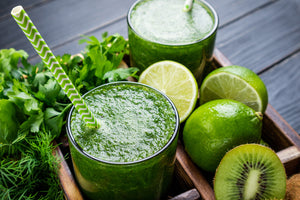Please Pass the Asparagus

Tender stalks of asparagus peeking their heads through the soil and emerging after a long winter is a welcome sign of spring. Eaten raw as part of a vegetable crudité platter, or grilled with lemon juice and olive oil, asparagus is a delicious snack or addition to a meal. But this vegetable brings more than nice flavor to the table; it’s also no slouch when it comes to health benefits.
Like other green vegetables, asparagus is a good source of several nutrients, particularly folate and vitamin K1. It also contains significant amounts of iron, copper, and manganese, along with vitamin C and carotenes, the latter of which are the precursors to vitamin A. As a non-starchy vegetable, it’s low in carbohydrate and high in fiber, making it a good go-to for low-carb and vegetarian meals alike.
Aside from its impressive nutrient content, asparagus contains compounds that have been shown to have beneficial effects for a number of health concerns. Mouse models of different types of cancer suggest that extracts isolated from asparagus may help cancer cells undergo apoptosis—a kind of “self-destruct mode” that cancer cells usually evade in order to perpetually stay alive and reproduce. These compounds may also help existing chemotherapy drugs work better, by making cancer cells more sensitive to their effects.
Two other areas where asparagus compounds have shown promise is in kidney health and chronic stress. Asparagus contains a substance that naturally inhibits activity of angiotensin-converting enzyme (ACE), an enzyme involved in regulating blood pressure. (You have probably heard the term “ACE inhibitors” used to describe drugs that help lower blood pressure.) Hypertension is very harmful for the kidneys, so maintaining a healthy blood pressure is key for kidney health.
As for stress, one of the most common and detrimental sources of stress in modern life is insufficient sleep. Not getting enough sleep can lead to elevations in cortisol, one of the hormones responsible for the “fight or flight” mechanism that helps people deal with stressful situations. However, chronically elevated cortisol levels can lead to weight gain and imbalances in other hormones. Asparagus extracts have been shown to help reduce cortisol levels and markers of stress-induced cellular damage in animal models of stress caused by sleep deprivation.
Of course, health benefits probably aren’t the first things that come to mind when you think about asparagus. More likely, you immediately think of the very unique odor asparagus imparts to your urine! Believe it or not, it’s a fairly contentious issue. It seems there are genetic factors involved in how much of the causative substances people produce, and in an even stranger turn of events, people differ in their ability to detect the odor—that is, some people who produce the odor can’t smell it!
If you’ve only ever seen the common green asparagus, you might be surprised to learn there are purple and white varieties, too. Purple asparagus owes its color to higher amounts of anthocyanins, phytochemicals that also lend color to blueberries, raspberries, and other similarly colored fruits and vegetables. Purple asparagus tends to be sweeter and have thicker stalks than the green. White asparagus retains its white color because the stalks are grown under a mound of soil, preventing the development of chlorophyll and the emergence of the green pigment.
If you’re thinking that asparagus is one of the last things you’d want to eat more of, that’s probably because the only way you’ve ever had it is boiled until soggy and lifeless—or worse, from a can. Try your hand at preparing it in other ways to reacquaint yourself with this tasty and nutritious spring vegetable. Drizzle with olive oil and toss with salt and pepper, then roast at a high temperature to bring out the surprising sweetness of asparagus. You can also pop it on the grill—perfect for outdoor entertaining as the weather warms up. (An indoor grill pan works just as nicely.)
Sources
- Ito T et al. Enzyme-treated asparagus extract promotes expression of heat shock protein and exerts antistress effects. J Food Sci. 2014 Mar;79(3):H413-9.
- Sanae M1, Yasuo A. Green asparagus (Asparagus officinalis) prevented hypertension by an inhibitory effect on angiotensin-converting enzyme activity in the kidney of spontaneously hypertensive rats. J Agric Food Chem. 2013 Jun 12;61(23):5520-5.
- Xiang J et al. Anticancer effects of deproteinized asparagus polysaccharide on hepatocellular carcinoma in vitro and in vivo. Tumour Biol. 2014 Apr;35(4):3517-24.
- David Brady







Comments 0